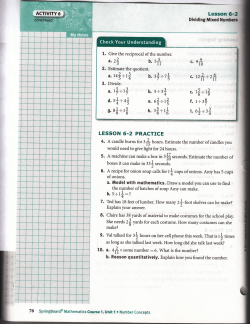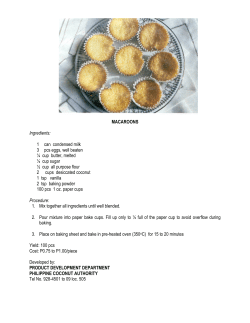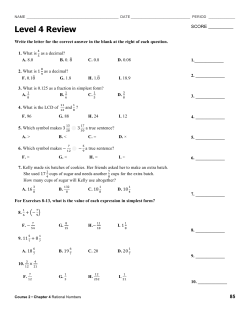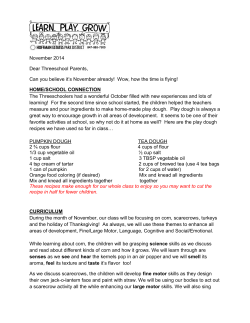
Clever in the Kitchen
IN THE KITCHEN A HealthWaves Signature Webinar Presented by Lindsay Dodds HealthWaves Coordinator Irving, TX +1-424-336-2000 [CA, Redondo Beach] +1-703-949-2000 [VA, Herndon] +1-410-649-3000 [MD, Baltimore] Conference ID: 7871094 OVERVIEW Challenges faced by picky eaters Daily recommendations for adults and kids Why the “good” stuff is so good Ways to be clever in the kitchen HOW MANY OF YOU HAVE EXPERIENCED THE FOLLOWING: Suzy - won’t eat anything that is green, if one green thing is on her plate, she refuses to eat her meal. Jimmy - gets upset when one Bobby - is interested in everything that is on the table food on his plate touches another food. BUT what is on his plate. PHRASES THAT HELP OR HINDER PHRASES THAT HINDER PHRASES THAT HELP “If you do not eat one more bite, I will be mad.” “This is a kiwi fruit; it’s sweet like a strawberry.” “Suzy, look at your sister. She ate all of her bananas.” “Has your tummy had enough? ” “See, that didn’t taste so bad, did it.” “Everybody enjoys different foods, don’t they? ” “No dessert until you eat your vegetables.” “We can try these vegetables again another time.” CHANGE THE WAY PICKY EATERS LOOK AT FOODS Make food fun Introduce one new food at a time Let them be your Sous-Chef Offer choices Enjoy the meal together Encourage small portions POLL How many servings of fruits should the average adult strive to eat daily? a. 4 cups b. 2 cups c. 5 cups d. 3 cups ANSWER The average adult should strive to eat 2 cups of fruit each day! USDA Daily Recommendations of Fruit 1 cup Children 2-3 years old 4-8 years old 1 to 1 1⁄2 cups Girls 9-13 years old 14-18 years old 1 1⁄2 cups 1 1⁄2 cups Boys 9-13 years old 14-18 years old 1 1⁄2 cups 2 cups FRUITS? BENEFITS May reduce risk for heart disease, heart attack, stroke and certain types of cancers. Fruits containing fiber may reduce the risk of obesity and type 2 diabetes. Potassium in fruits may lower blood pressure, reduce the risk of developing kidney stones, and help decrease bone loss. Fruits have lower calories per cup than most foods. TO ADD MORE FRUIT IDEAS Be saucy with fruits - Try pureeing to make a sauce that can be added to dishes. Bake with fruits - Add fruits into recipes in the place of fat. “Sandwich” in fruits - Add some crunch or sweetness to your next sandwich by incorporating a layer of sliced fruit. Take a fruit to lunch - Make this part of your everyday habit of eating at least one fruit during your lunch. POLL How many servings of vegetables should the average adult strive to eat daily? a. 4 cups b. 2 cups c. 5 cups d. 3 cups ANSWER The average adult should strive to eat 2 cups of vegetables each day! USDA Daily Recommendations of Vegetables Children 2-3 years old 4-8 years old Girls 9-13 years old 14-18 years old Boys 9-13 years old 14-18 years old 1 cup 1 to 1 1⁄2 cups 2 cups 2 1⁄2 cups 2 1⁄2 cups 3 cups VEGGIES? BENEFITS May reduce risk for heart disease, heart attack, stroke and certain types of cancers. Naturally low in fat and calories. None have cholesterol. Important sources of many nutrients, including potassium, dietary fiber, folate (folic acid), vitamin A and vitamin C. Vitamin A keeps eyes and skin healthy and helps to protect against infections. TO ADD MORE VEGGIES IDEAS Be sneaky with your sauces Boil vegetables into sauces or add in sliced vegetables. Shred those veggies - Finely shred vegetables and add them to casseroles or pizza. Get cheesy with it - A layer of reduced-fat cheese can help encourage picky eaters to eat vegetables. Mix it real good - Mash, smash, or puree vegetables into a soup or dressing. WHEN MORE IS LESS BIGGER PORTION OF LOWER CALORIES Purees - Easy, inexpensive way to bulk up nutrients and portion sizes without unwanted calories. Slice, Dice, Chop, Grate Different cutting methods add texture, shape, and positively affects portion perception and satiety. The basic idea is to make portion sizes look bigger by adding more lower calories foods. Incorporate Air - Puffed snacks give the illusion of bigger portions but with less calories. Simply Add - Add various vegetables to dishes. RESOURCES www.eatingwell.com Courtesy of Ellie Krieger MS, RD “Is “Eat Less” the Best Message? When bigger portions can be better...and do-able delicious?” Presented at Food Nutrition, Conference, and Expo October 7, 2012. HEALTHWAVES • • • • • • Wellness and Fitness Coaching Biometric Health Screenings Group Fitness Classes Healthy Living and Wellness Classes On-site Staff Challenges, Virtual Wellness, and more Contact your HealthWaves coordinator or email HealthWavesWebinars@ngc.com QUESTIONS? THANK YOU!
© Copyright 2025










